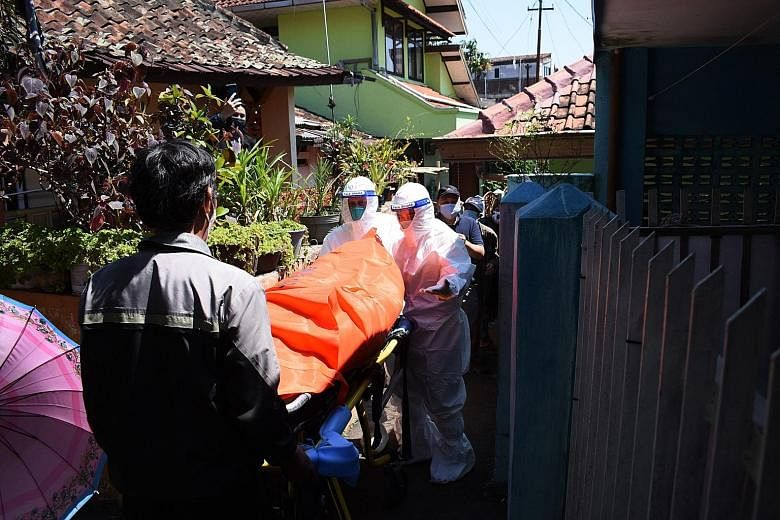Despite Indonesia's efforts to curb the surge in Covid-19 cases and ease the burden of overwhelmed hospitals, many Covid-19 patients are still dying at home, out of sight to all but their families.
A 70-year-old woman in Indramayu, West Java, died at home on July 24 while in self-isolation after her 56-year-old daughter died of a high fever following a trip to Jakarta, reported local media.
According to citizen data platform LaporCovid-19, 2,705 Covid-19 patients have died at home over the past two months, with many unable to access much-needed treatment at overwhelmed hospitals.
Standing in front of her house, Ms Yulia (not her real name) could only look at her sick younger brother from a distance after he and his family were turfed out of their company-provided house.
It was the last time she saw him. The 42-year old man died 12 days later on July 19, shortly after he had finally been admitted to a hospital.
In his texts to her the night before he died, he said the nurses were busy with many patients. "He also complained he did not receive maximum treatment. I tried to motivate him to recover, pray and do what the nurses asked him," Ms Yulia told The Straits Times.
The surge in Covid-19 cases in Indonesia is severely straining the health system, even as authorities try to increase space in hospitals.
The epicentre of the pandemic in South-east Asia, Indonesia reported 47,791 new cases yesterday, bringing the total to 3.29 million. Deaths in the past 24 hours rose by 1,824, with overall fatalities now numbering 88,659.
As fully occupied hospitals reject patients, infected people have gone home to recover without much-needed intervention.
Health experts said that the Delta variant, which is driving the exponential spike in caseloads across Indonesia, can cause rapid deterioration in patients' conditions.
Jakarta resident Darussalam, 63, took his wife to hospital in late June after she had experienced Covid-19 symptoms for a week, starting with a runny nose and cough that progressed to breathing difficulties which her family relieved with a mobile oxygen canister.
"Some of our relatives were infected and mostly isolate themselves," he told ST. "She did the same at home. We thought she must be positive before she was tested. But we knew the hospitals were full."
The 44-year-old mother of three died on July 4, a few days after she went into Pelni hospital in Jakarta, where there were over 30 patients waiting to get into intensive care.
Dr Nur Chandra Bunawan, an internal medicine physician at Jakarta's Kramat Jati general hospital, acknowledged most patients rushed to the hospital since June had shown severe symptoms, like shortness of breath.
"Many patients likely come too late because they decided to self-isolate. Those testing positive with no symptoms or mild symptoms think it's okay to do so, whereas this should be determined by medical workers," he said. "If medical examinations, such as blood and X-ray tests, show they are safe, they can self-isolate. So, this should not be a patient's decision."
Dr Chandra said combined drugs recommended by doctors would also be crucial to treat patients.
The situation has improved since authorities began imposing a partial lockdown across most affected regions since early July, with five provinces across Java, Indonesia's most populous island, reporting dwindling caseloads, according to the Health Ministry.

